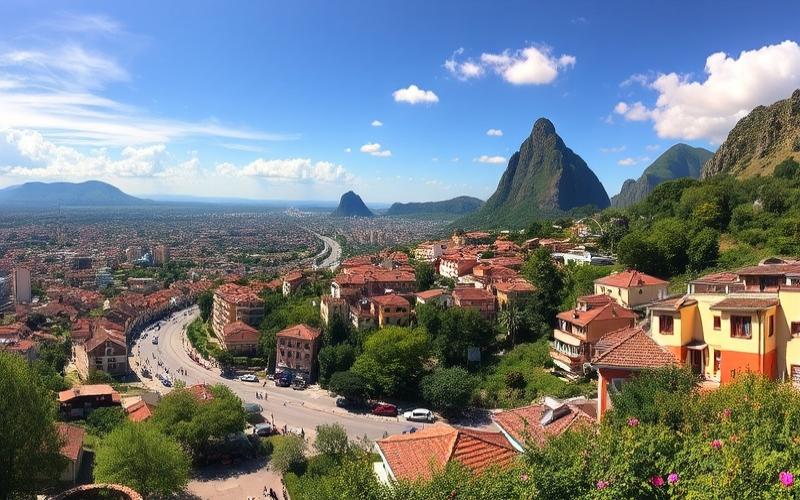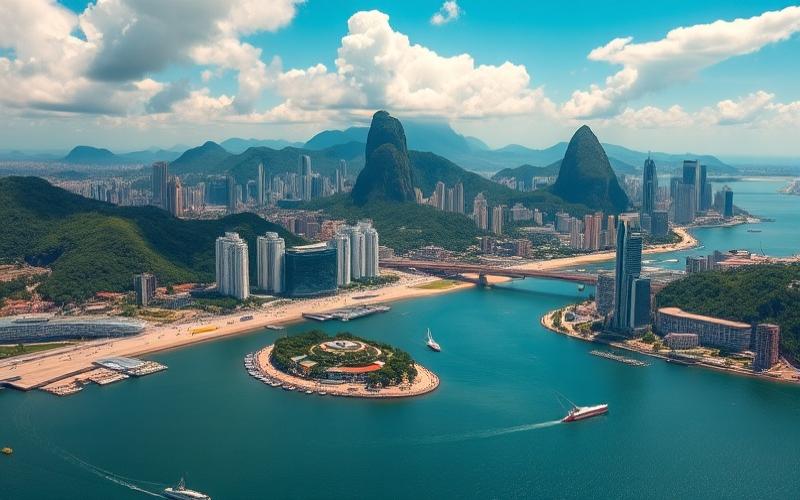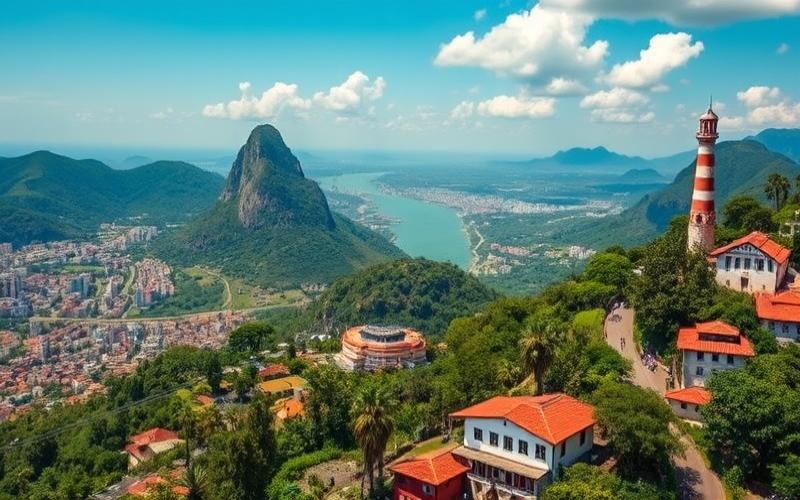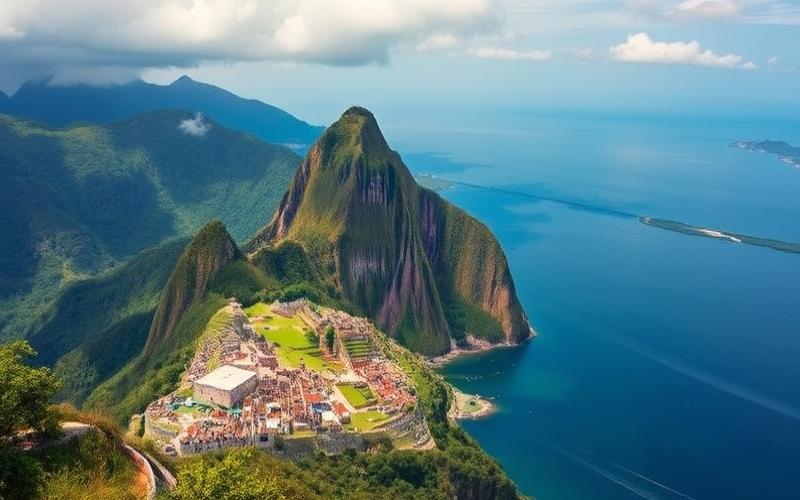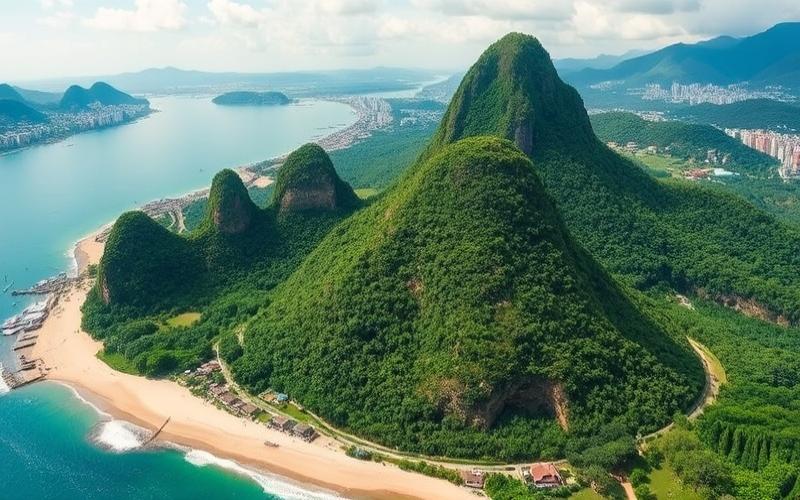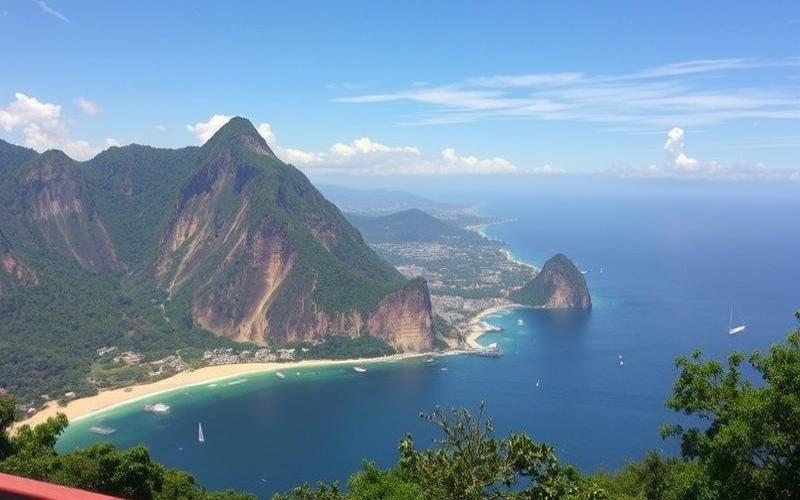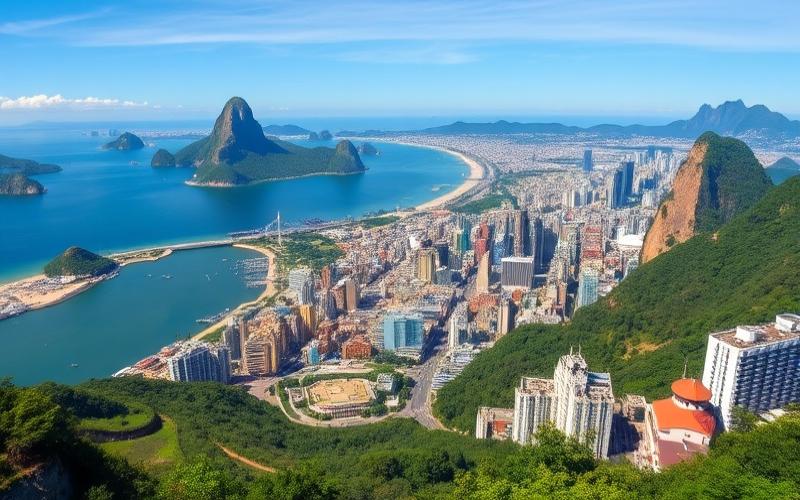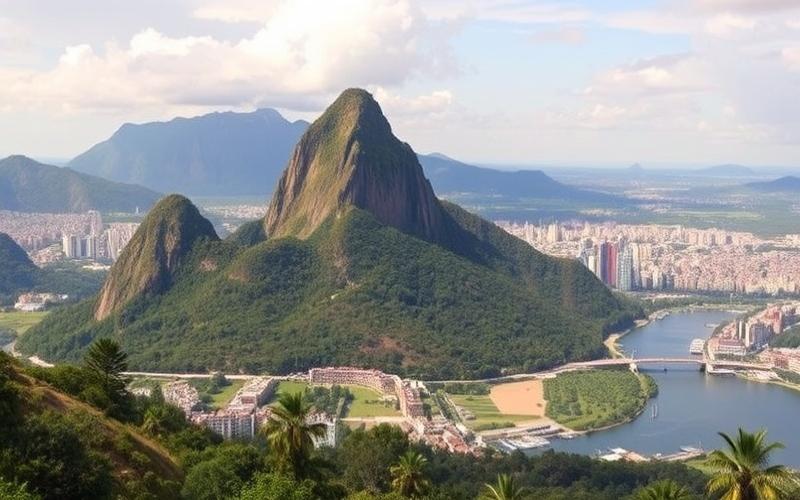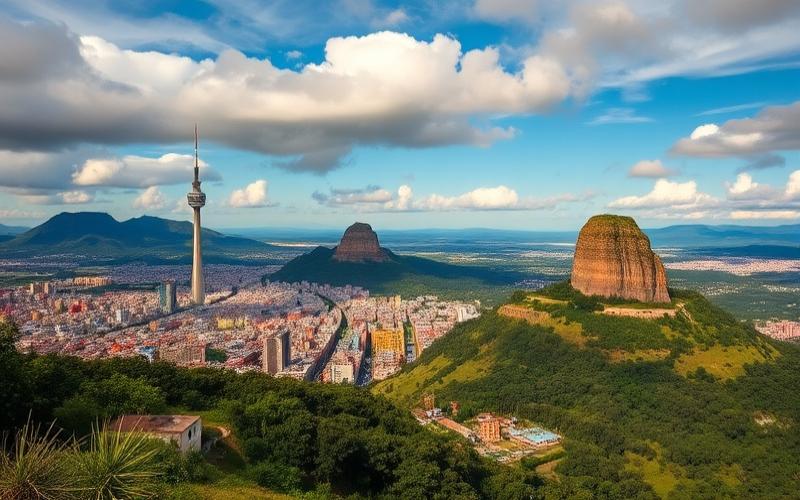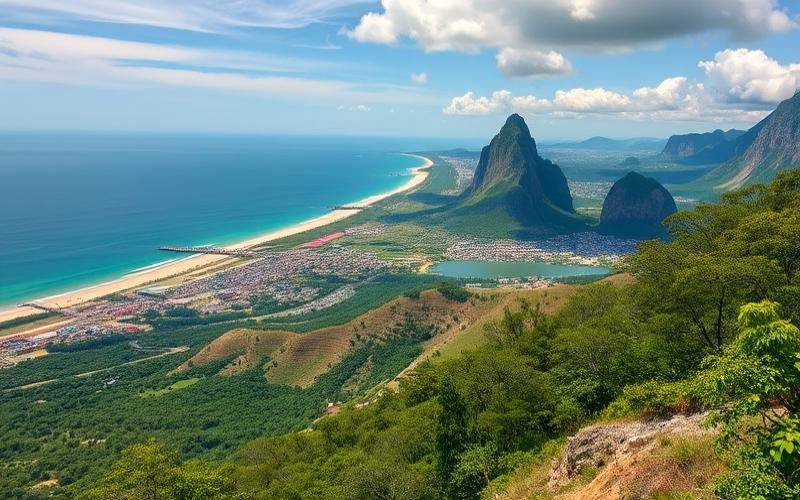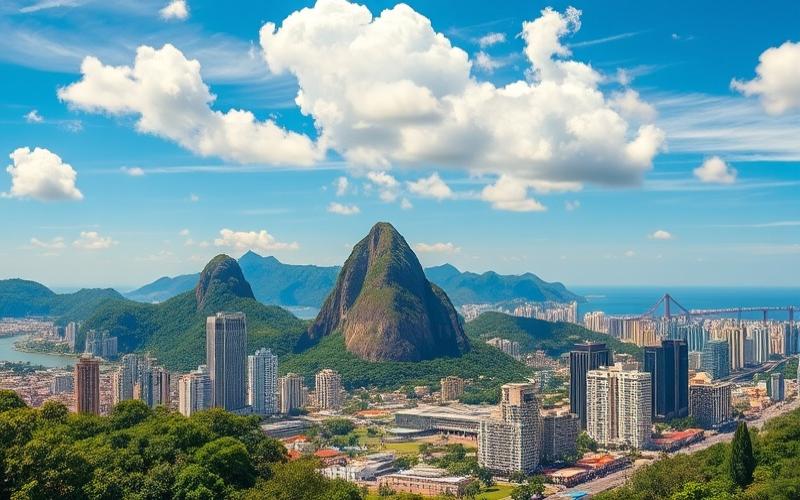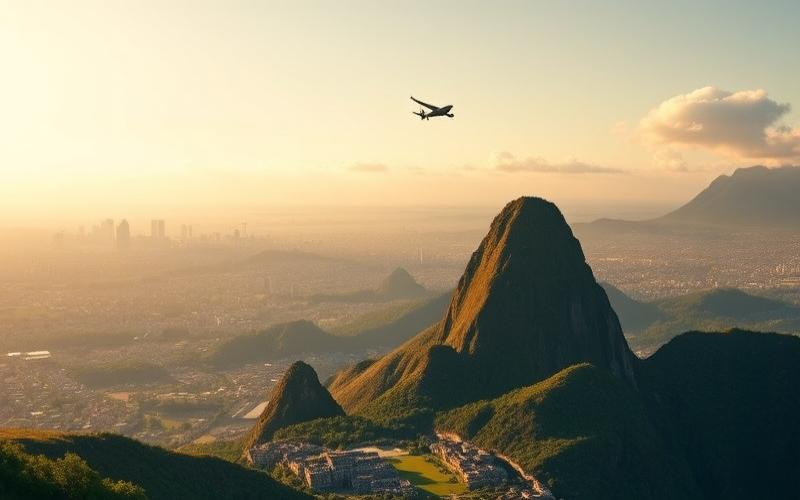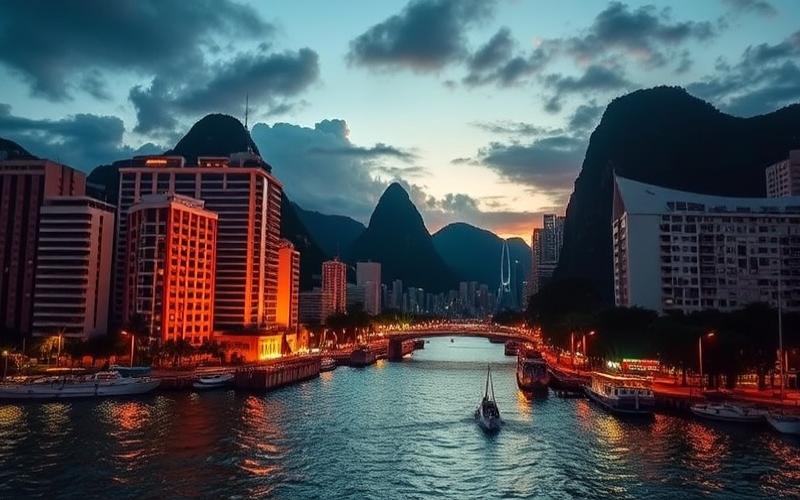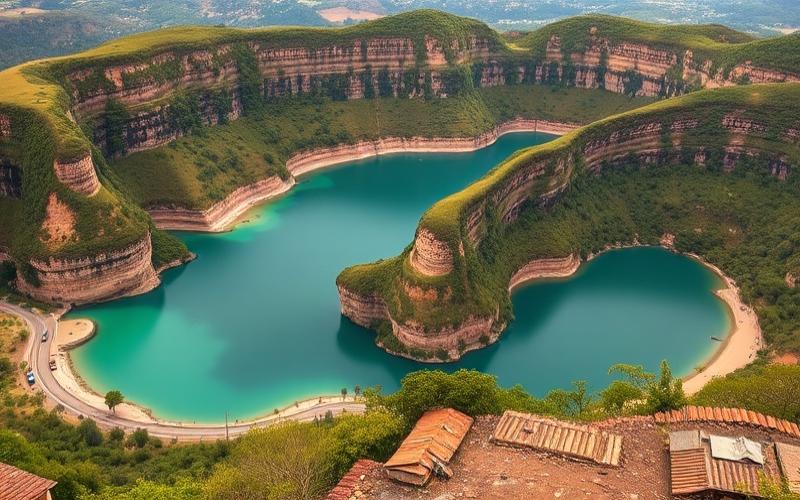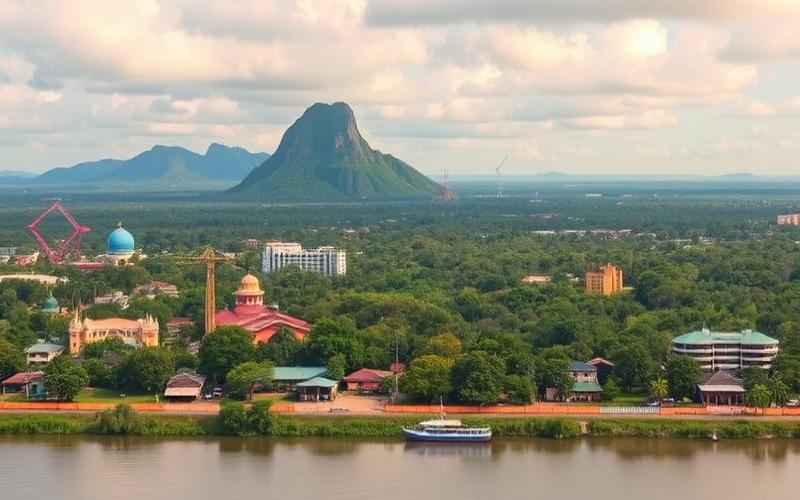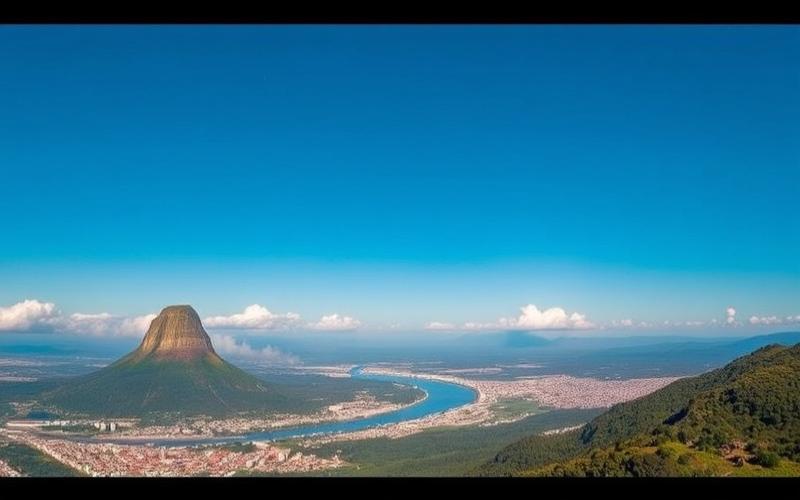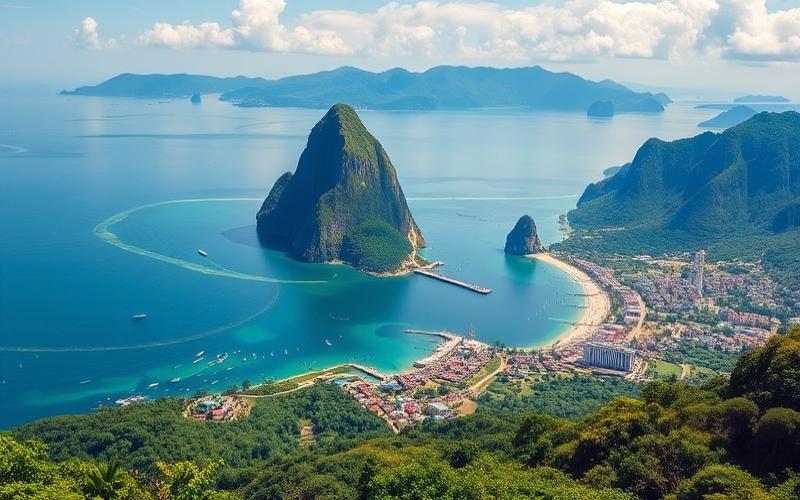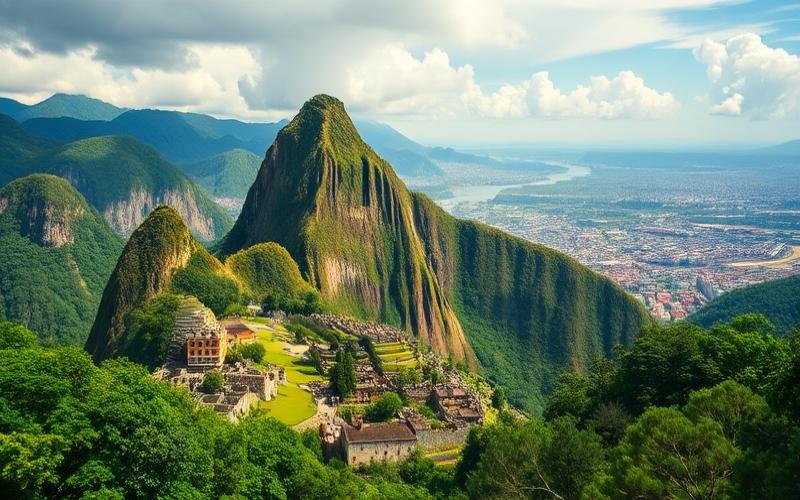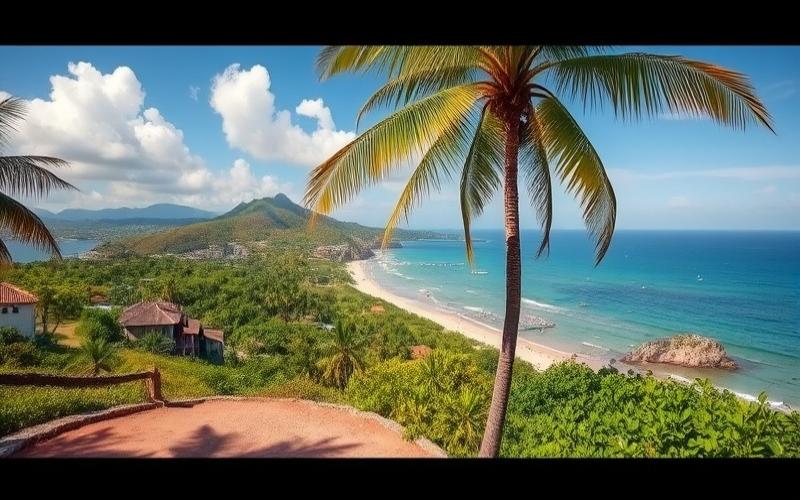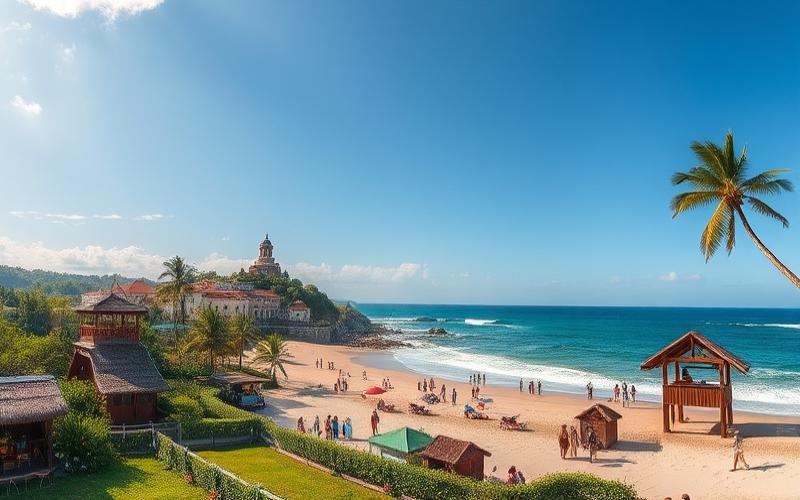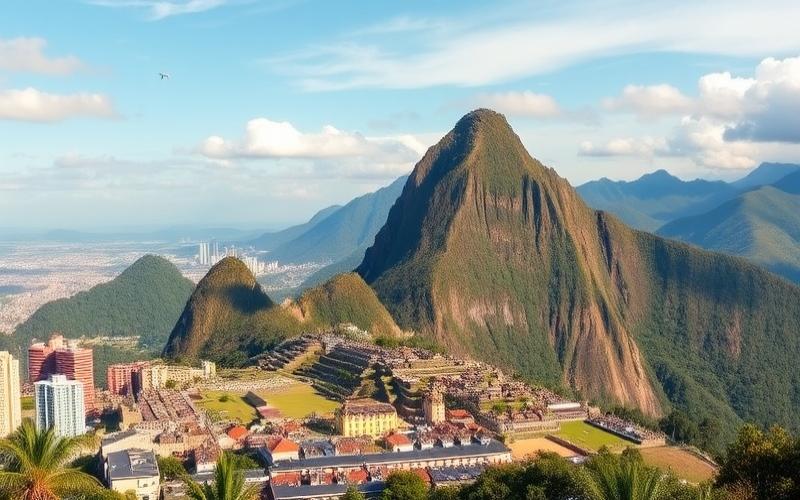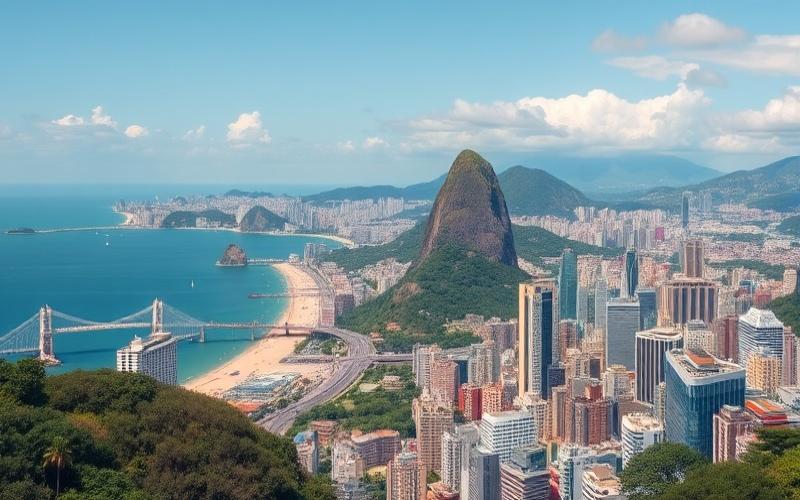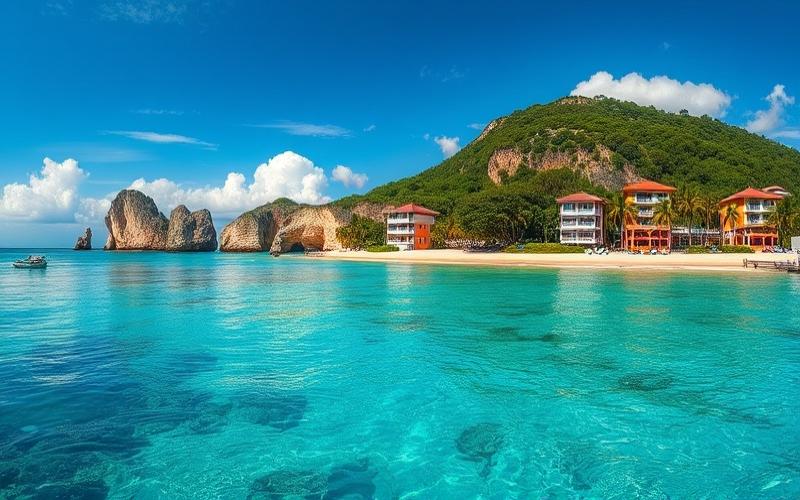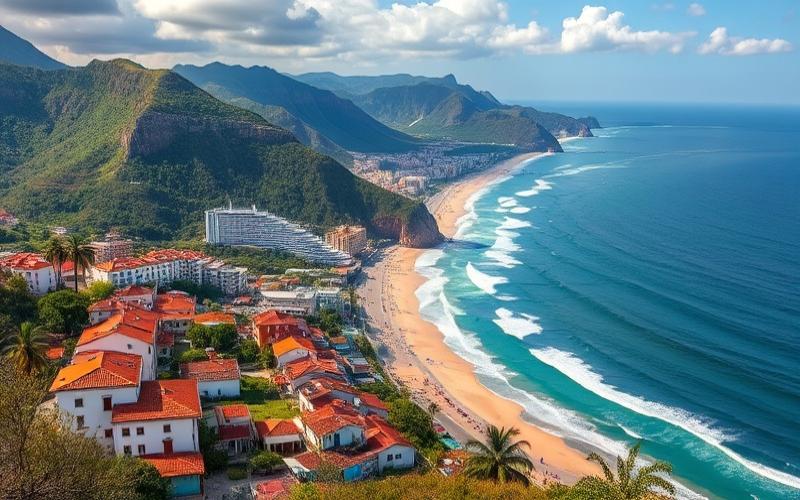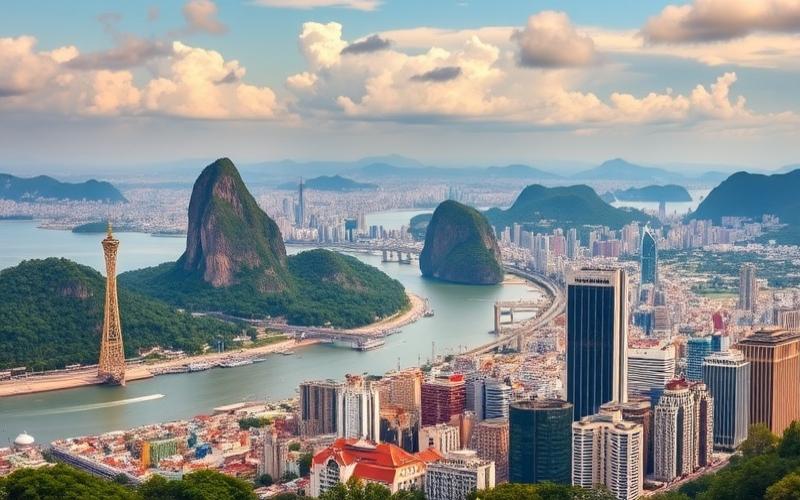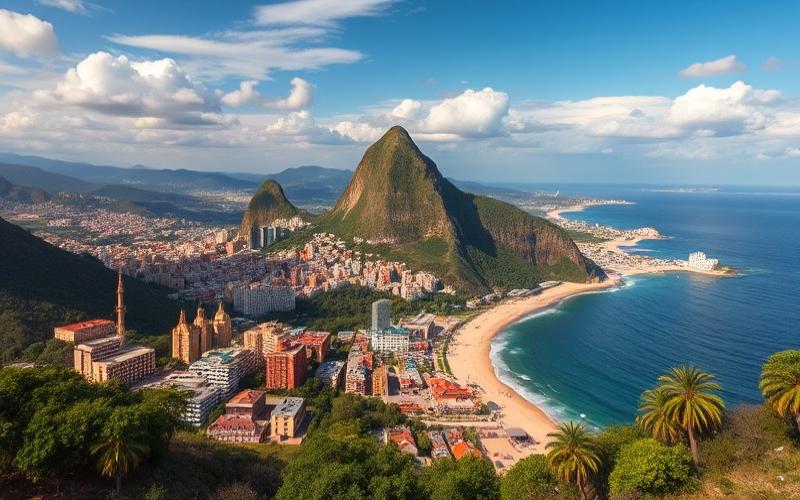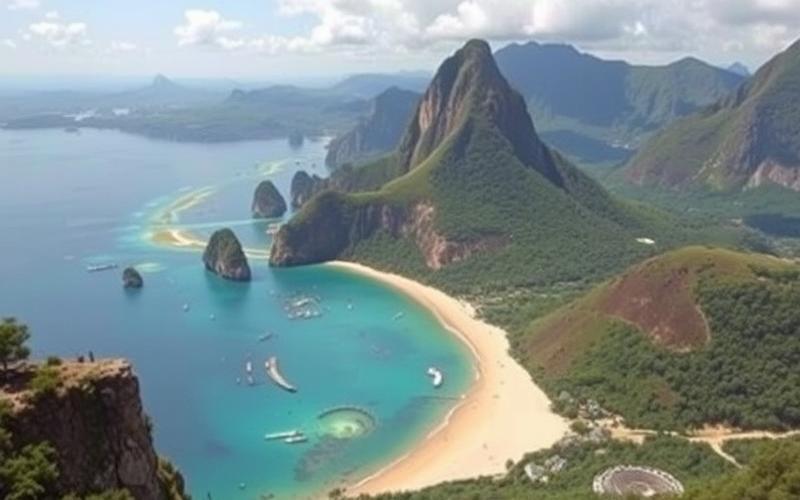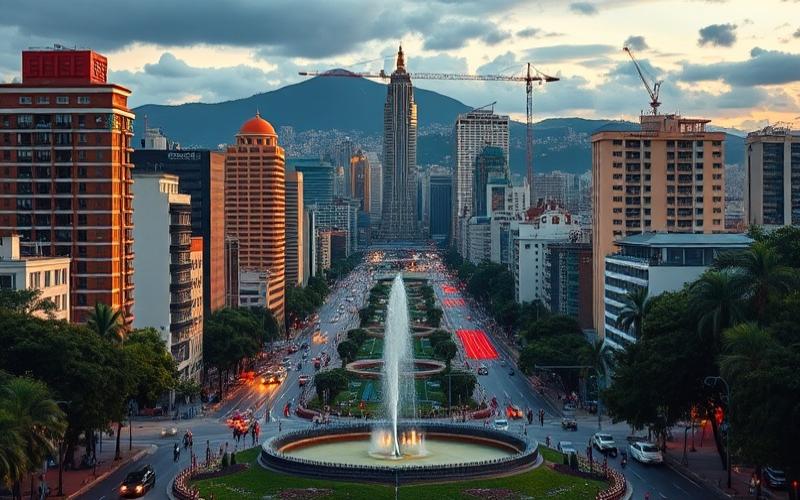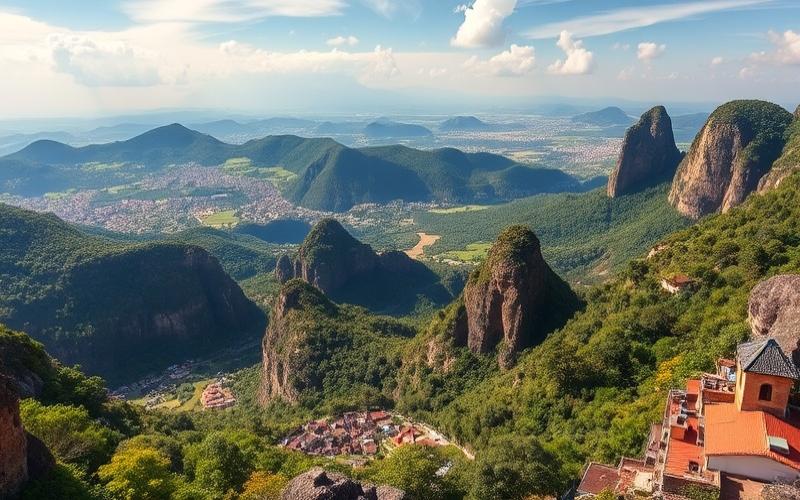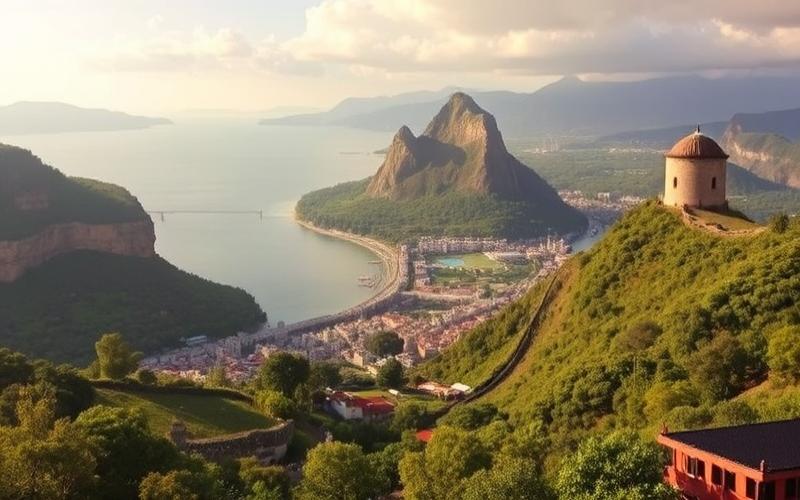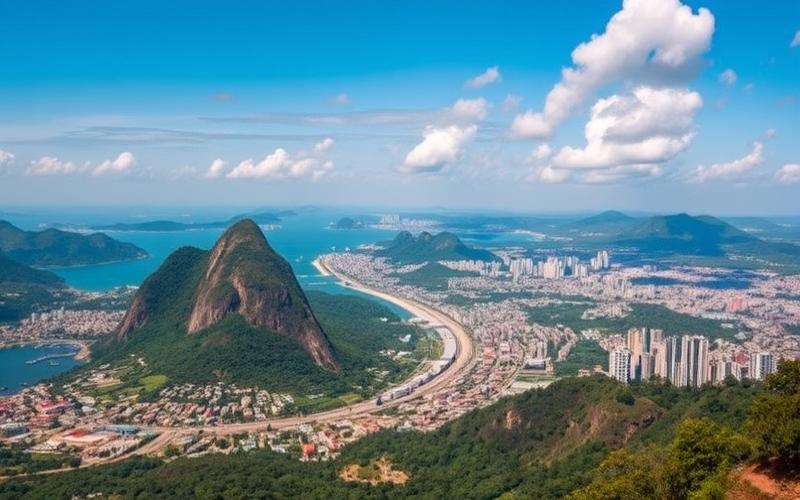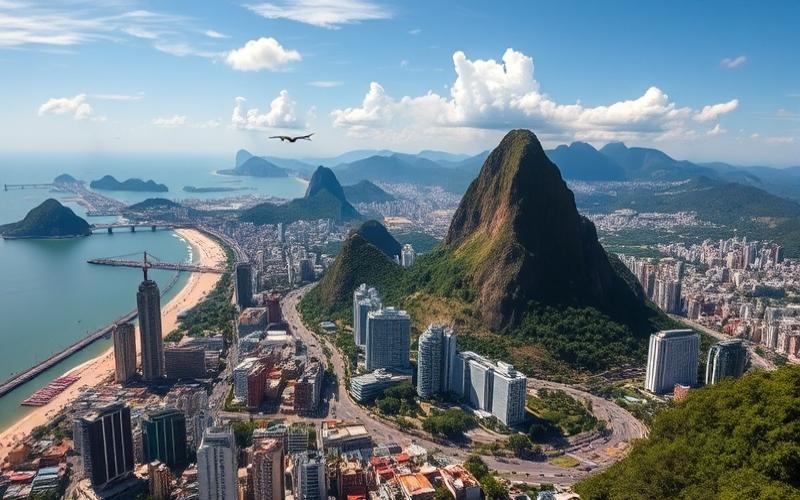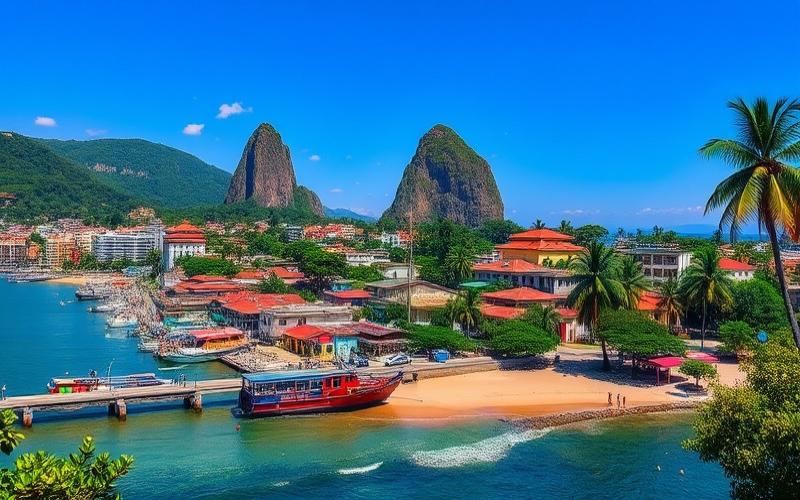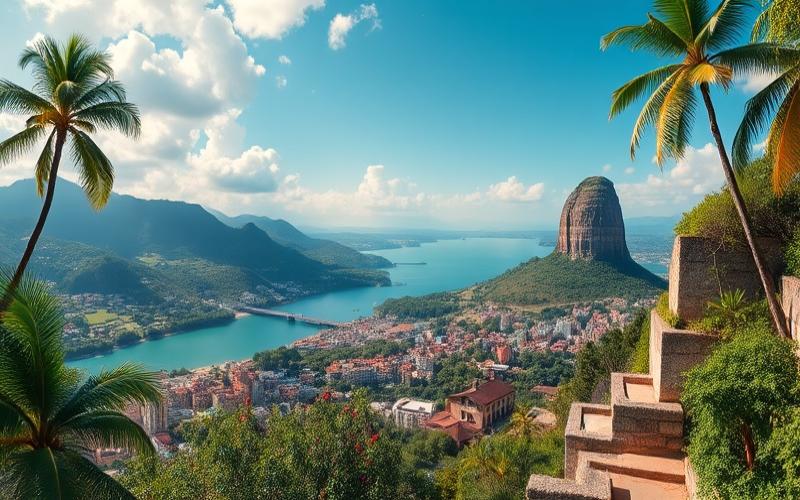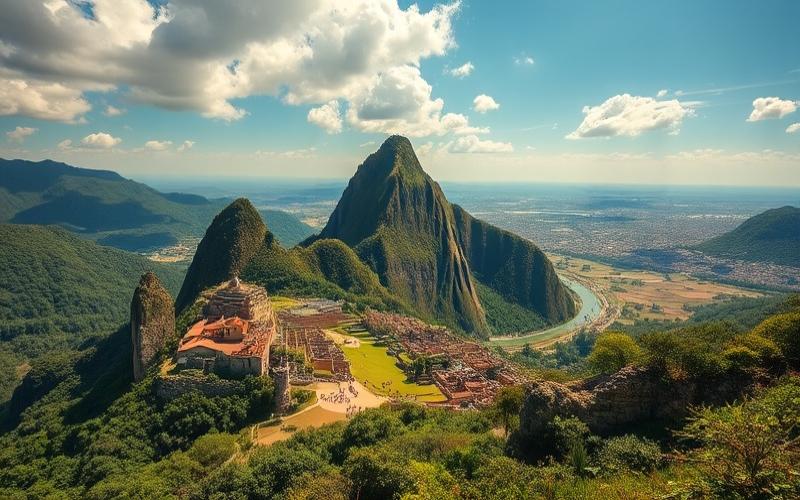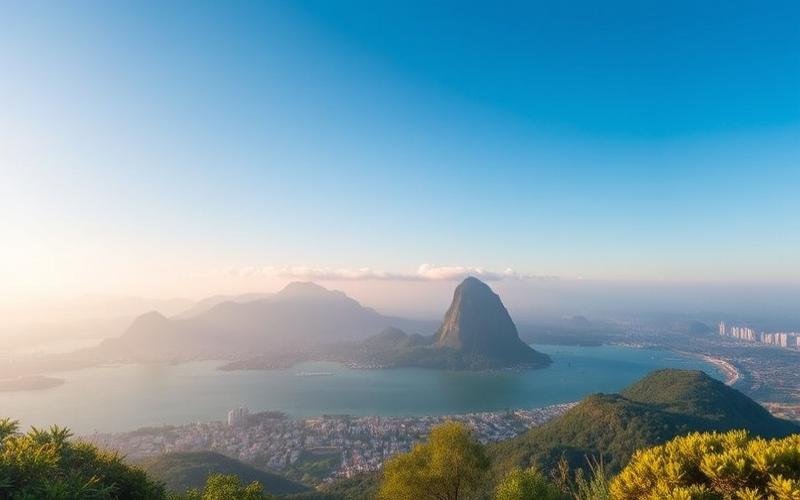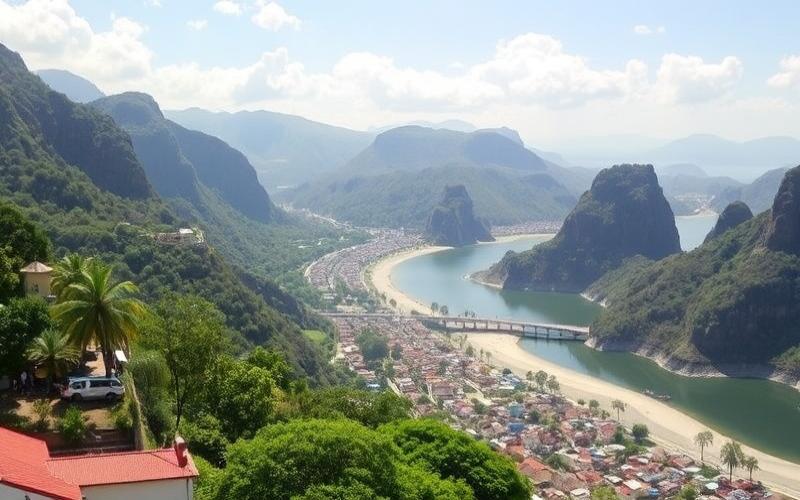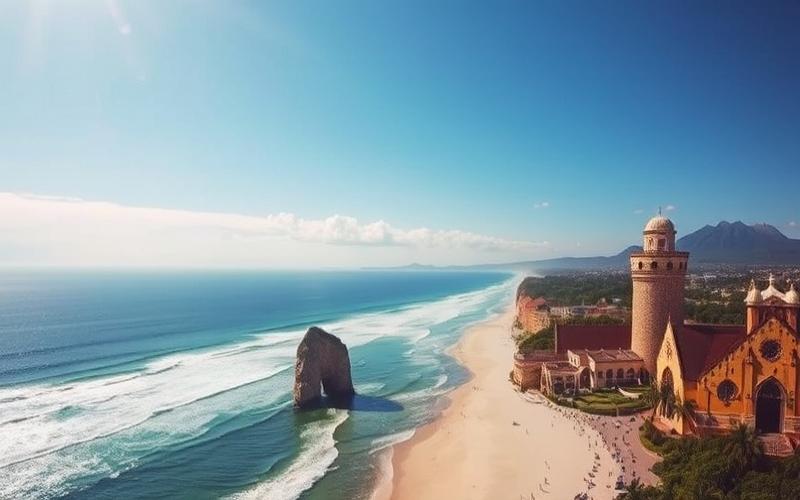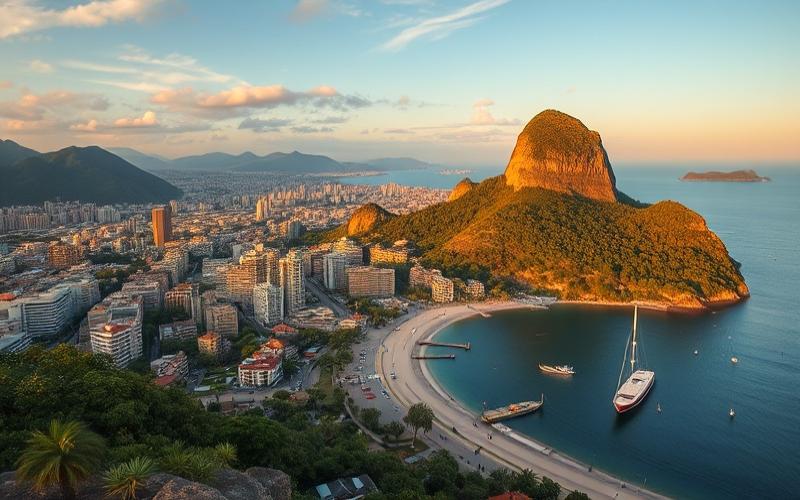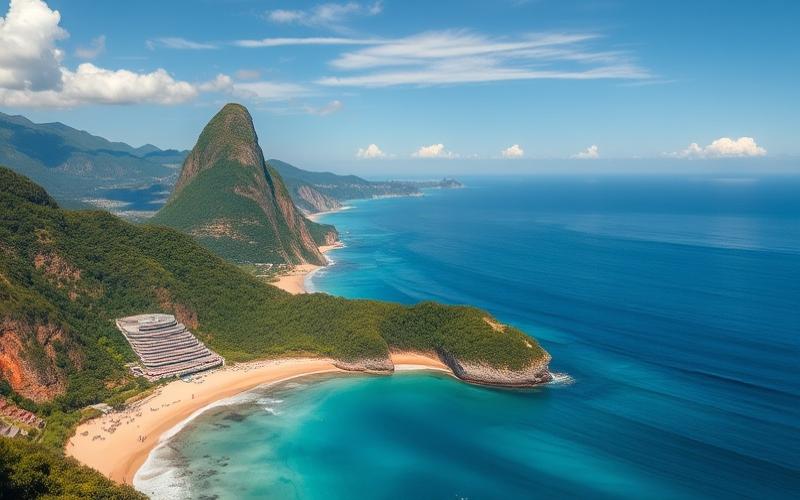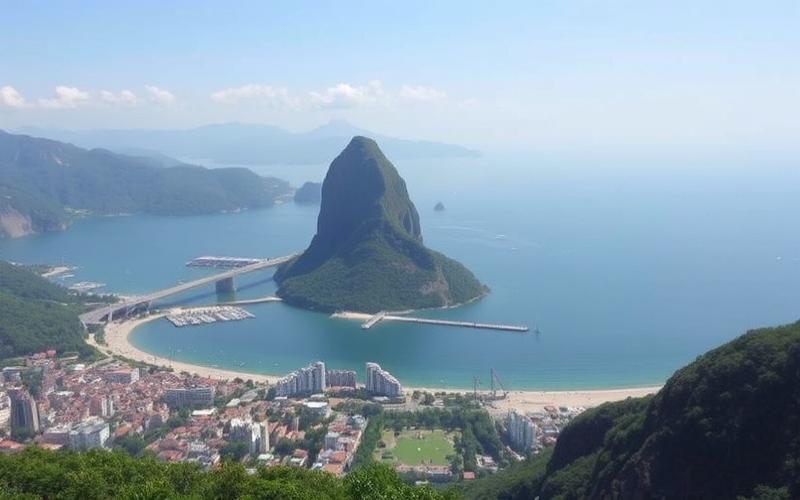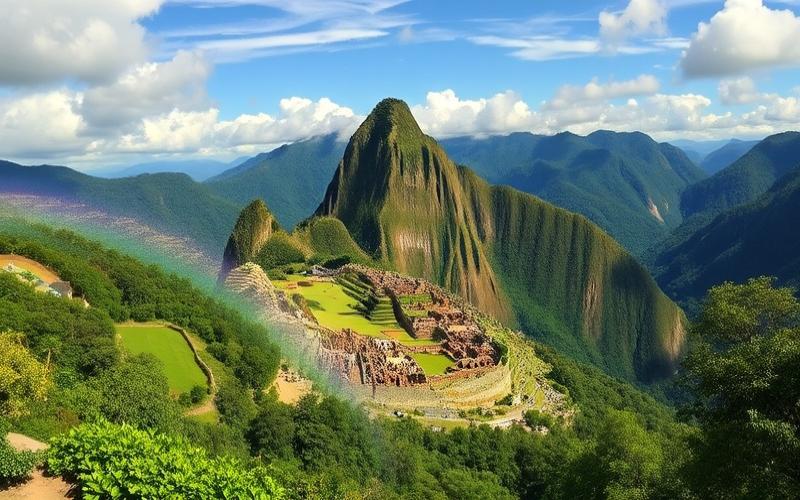
 Published on and written by Cyril Jarnias
Published on and written by Cyril Jarnias
Investing in Brazil’s Hotel Sector
Investing in Brazil’s hotel sector can prove to be a lucrative venture, but it requires meticulous planning and a thorough understanding of the local market. This vibrant country, renowned for its breathtaking landscapes and rich culture, offers numerous opportunities for savvy investors.
Good to know:
Before diving in, it’s essential to consider key factors such as local legislation, strategic location, and operational costs.
This article presents a comprehensive checklist to guide investors through each step of the process, from initial research to final acquisition, ensuring a smooth transition into hotel ownership in this dynamic market.
Brazil Hotel Market Overview
The Brazilian hotel market shows sustained growth trajectory in 2024-2025, driven by the recovery of international arrivals, expansion of global chains, and the rise of eco-friendly and boutique segments, despite a volatile macroeconomic context and persistent political risks. Performance varies across key tourist regions (Southeast, Northeast, South, North/Center-West), with demand peaks during major sporting and cultural events that temporarily boost occupancy rates and prices.
Recent Data Overview and Key Trends
Market Size and Growth:
- Hotel market value estimated at approximately $9.14 billion USD in 2024, with projected growth at a CAGR of about 6.2% in the medium term.
- Q1 2025: Notable increase in hotel demand stimulated by rising international arrivals and marketing campaigns toward Europe.
Demand and Accommodation Mix:
- Mid-scale and upscale segments dominate (~65% market share of branded/chain hotels), reflecting a preference for value in metropolitan areas and business hubs.
- Expansion of international brands (e.g., W, Hilton) concentrated in São Paulo and major capitals, enhancing upscale offerings and competition.
- Rise of eco-friendly and boutique hotels aligned with demand for sustainable tourism and personalized experiences.
Supply Dynamics:
The supply remains fragmented with a still significant share of independent hotels, while chains strengthen their presence through new openings and partnerships.
Regional Performance and Occupancy Rates
Southeast (São Paulo, Rio de Janeiro, Minas Gerais, Espírito Santo)
- São Paulo: MICE and business hub; expansion of global brands supports the rise of upscale. Trade shows and conventions generate strong weekday occupancy rates, with normalization on weekends.
- Rio de Janeiro: Strong beach seasonality and cultural events; international demand fuels post-pandemic recovery with peaks during major festivals.
Northeast (Bahia, Pernambuco, Ceará, Rio Grande do Norte, Alagoas)
Major beach destination with a family/leisure mix; rise of resorts and eco-chic boutiques, driven by growing domestic and international flows.
South (Paraná, Santa Catarina, Rio Grande do Sul)
Growth driven by nature/gastronomy tourism and regional events; progression of mid/upscale offerings and differentiated experiences.
North and Center-West (Amazon, Pantanal, Brasília)
Selective development focused on eco-tourism and institutional business; niches in boutique and sustainable lodges, offering higher ADRs on limited inventory.
Occupancy and Pricing:
- Q1 2025: General improvement in RevPAR supported by increased international demand; urban markets show robust weekday occupancies, while beach leisure destinations display seasonal peaks.
- Mid/upscale segments capture the bulk of volume, with increased pricing power in capitals and during high season.
Most Popular Accommodation Types
- Mid-scale and upscale chain hotels: Majority market share, positioned in urban centers and key tourist areas.
- Luxury and lifestyle hospitality: Growth fueled by entry/expansion of international brands, enhancing standards and services in major cities.
- Boutique and eco-lodges: Strong traction with travelers focused on sustainability, local immersion, and personalization.
Impact of Sporting and Cultural Events on Demand
Major events significantly boost occupancy and prices in host cities, with spillover effects on neighboring markets due to extended stays and media-driven international appeal.
Major cultural festivals (e.g., regional carnivals, music festivals, contemporary art) support occupancy peaks in tourist capitals of the Southeast and Northeast, favoring upscale and short stays.
Hotel investments and pre-openings intensify around event calendars, particularly through international chains targeting metropolitan areas.
Illustrative Case Studies
São Paulo – Rise of International Brands:
- Expansion of W and Hilton strengthens premium offerings in the metropolis, intensifying competition and driving up service quality and experiential F&B.
- Measurable effect: Increase in corporate and MICE demand, and ability to maintain competitive ADRs on weekdays.
Northeast – Boom of Sustainable Boutiques:
- Increased deployment of eco-friendly and boutique hotels meeting demand for sustainable tourism; these assets operate with sustained margins through differentiation, despite limited inventory.
- Pricing positioning: Higher ADRs justified by experience, location, and sustainable practices.
Short and Medium-Term Challenges
Economic Fluctuations:
- Pressure from operating costs (inflation) and exchange rate volatility affecting margins and investment, despite strong international demand dynamics.
- Sensitivity of domestic demand to economic cycles, influencing off-season occupancy.
Political and Regulatory Environment:
Political uncertainties potentially slowing investment decisions and project development; need for increased visibility on taxation and licenses.
Competition and Fragmentation:
- Increased competition from international chains in urban hubs; tension on recruitment and retention of qualified talent.
- Persistent fragmentation of independent supply requiring investment in distribution, technology, and standardization of standards.
Sustainability and Customer Expectations:
Need for CAPEX investments in energy efficiency and green certifications to meet demand and ESG standards, while managing ROI.
Recent Indicators and Statistical Data
- Total hotel market: ~$9.14 billion USD (2024); projected growth ~6.23% CAGR to ~$12.35 billion USD in the medium term.
- Share of mid/upscale segments in chains/brands: ~65%.
- Q1 2025: Significant increase in international arrivals, supported by campaigns toward Europe; direct effect on hotel demand and RevPAR.
- Pipeline/expansion: New openings and upscaling in São Paulo and major metropolises through W, Hilton, and other international players.
Strategic Implications for Operators and Investors
- Prioritize urban markets with strong corporate/MICE demand (São Paulo, Brasília) and high-profile leisure destinations (Rio, Northeast), with seasonal calibration of supply.
- Position standardized mid/upscale products in metropolises, and differentiated boutique/eco concepts in nature and beach destinations.
- Strengthen resilience to macro shocks (inflation, FX) through energy optimization, supply contracts, and dynamic revenue management.
- Leverage event calendars for pricing/packaging strategies and DMO partnerships to smooth seasonality.
Good to know:
The Brazilian hotel market is currently characterized by a high concentration of supply in key tourist regions, such as Rio de Janeiro, São Paulo, and Bahia, where occupancy rates often exceed 75%, especially during major sporting and cultural events like Carnival and soccer matches. Various establishments, ranging from hostels to luxury hotels, cater to a diverse demand that continues to grow thanks to the steady influx of domestic and international tourists. However, the sector must contend with challenges such as economic fluctuations and political tensions, which can affect investments and consumer confidence. In 2022, revenue per available room (RevPAR) increased by 11%, according to an STR study, reflecting post-pandemic recovery but also highlighting the importance of strategic management in an unstable environment.
Essential Steps for Acquiring a Hotel in Brazil
Main steps for acquiring a hotel in Brazil
- Assess feasibility and define investment thesis
- Define the target hotel’s positioning (urban business, leisure resort, mid-scale, luxury), operational strategy (owner-operator, franchise, management contract) and holding period.
- Identify the most suitable acquisition vehicle: individual with CPF or Brazilian company with CNPJ based on deal size, taxation, and financing.
- Pre-qualify a local law firm and accounting firm for the transaction, due diligence, and fiscal onboarding.
- Preliminary analysis of the Brazilian hotel market
- Study demand by segment and city: leisure seasonality (Northeast), corporate demand (São Paulo, Campinas), MICE (Rio, Brasília), historical ADR/RevPAR and occupancy rates.
- Map direct competition, dominant OTAs, presence of major chains, and franchise/management dynamics.
- Check macro factors: BRL exchange rate, inflation, cost of credit, local taxation (IPTU) and major operating expenses (labor, energy, service taxes).
- Involve a local broker/consultant and collect occupancy and pricing data by micro-market to support the business plan.
- Regulatory checks and legal requirements
- Obtain a CPF (if acquiring in personal name) or establish a local company to obtain a CNPJ; these tax IDs are required for contracting, paying taxes, and being registered in the real estate registry.
- Review real estate framework: audit of property title, registrations in the real estate registry, and absence of debts or encumbrances on the property (IPTU, mortgages, disputes).
- Contracts to formalize with a notary: purchase agreement then public deed and registration in the real estate registry to transfer ownership in a legally binding manner.
- Local hotel operating regulations: municipal operating license (alvará), health license (Vigilância Sanitária), fire safety (Corpo de Bombeiros), price display, and accessibility compliance; anticipate municipal checks and timelines before effective takeover.
- Comprehensive due diligence (real estate, corporate and operational)
- Legal: continuity of contracts (suppliers, franchise/management, commercial leases if separate building), labor/consumer disputes, existing licenses and their transferability.
- Tax and accounting: audit of local taxes (IPTU), service taxes, withholdings, tax regime of the target entity; verification of arrears and potential penalties.
- Operational: technical condition (rooms, MEP, fire), deferred capex, kitchen and pool compliance, IT/PMS systems, customer satisfaction, OTA dependency.
- Negotiation with current owner
- Structure offer with conditions precedent: obtaining financing, key permits, absence of hidden liabilities, transfer of critical licenses and contracts.
- Negotiate scope: building + business vs. business only; FF&E and OS&E inventory; takeover of stocks, customer advances, supplier accounts and social debts.
- Secure timeline: earnest money deposit, penalty clauses, escrow holdbacks for risks discovered post-closing, seller assistance during transition period.
- Frame confidentiality and exclusivity; plan for sworn translation of essential documents.
- Procedures for licenses and permits
- File or transfer municipal alvará, health and fire safety licenses with local authorities; some licenses require new inspection upon change of control.
- Update tax registrations under buyer’s name (CPF/CNPJ) and real estate cadastre; payment of registration fees and notary fees upon transfer.
- If franchise/management contract: obtain franchisor/manager approval and sign transfer amendments before closing.
- Financial and tax considerations
- Financing: compare local debt (Brazilian banks) vs. foreign currency debt; integrate BRL exchange risk, operating covenants and collateral requirements.
- Taxes and recurring costs: IPTU (property tax), service taxes, employee social charges, franchise/management fees; budget CAPEX for compliance and repositioning.
- Transaction costs: notary, registration, legal and accounting fees; the process can take several months—anticipate timeline and need for cash buffer.
- Structuring: choose tax regime and structure (asset vs. shares) to optimize tax burden and dividend distribution, with local advice.
- Closing and operational transfer
- Finalize public deed at notary and its registration in the real estate registry; property transfer is only legally binding after effective registration.
- Hand over system access (PMS, channel manager, accounting), utility contracts, insurance, suppliers, and OTA accounts; inventory and accept transferred assets.
- Management transition and service continuity
- 90-day plan: maintain quality, stabilize teams, secure sales channels, execute priority compliance actions.
- Staff management: audit of contracts and benefits, transparent communication about takeover, retention plan for key positions, training on new standards and systems.
- Customer relations and reputation: preserve existing bookings, manage pricing and cancellation policies during switchover, respond to reviews, launch CRM reactivation campaign.
- Strategies to attract and retain customers
- Distribution and revenue: optimize direct/OTA mix, update website and booking engine, deploy yield management and local packages.
- Marketing: partnerships with DMC/agencies, local SEO, meta-search, geo-targeted campaigns; storytelling aligned with positioning.
- Product and experience: quick wins CAPEX with high impact (bedding, Wi-Fi, breakfast), simple loyalty program, corporate offers for low season, market-valued sustainable initiatives.
Summary Table of Steps, Responsibilities and Deliverables
| Key Step | Main Responsible | Deliverables | Typical Timelines |
|---|---|---|---|
| Market analysis and thesis | Investor + consultant | Market study, business plan | 2–6 weeks |
| Legal/tax/operational due diligence | Lawyer + accountant + engineer | DD reports, risk list | 3–8 weeks |
| Negotiation and contracts | Investor + lawyer | LOI, purchase agreement, deed | 2–6 weeks |
| Licenses and registrations | Lawyer + local team | Alvará, health, fire, real estate registry | 4–12 weeks |
| Financing | Investor + bank | Term sheet, collateral, closing funds | 4–10 weeks |
| Operational transition | General management | 90-day plan, SOP, training | 4–12 weeks |
Essential Operational Checklist
- Obtain CPF/CNPJ and engage lawyer and accountant.
- Verify title, real estate registry, debts and IPTU payment.
- Formalize purchase agreement/deed with notary and register transfer.
- Confirm transferability of licenses and contracts; plan inspections.
- Secure financing and plan cash reserve.
- Update systems, suppliers, insurance and sales channels.
- Communicate with staff, customers, franchisors/managers.
- Launch marketing quick wins and operations to support RevPAR.
Anticipate administrative delays and high document volume; success depends on rigorous due diligence, a deed registered in the real estate registry, and structured transition management.
Good to know:
When acquiring a hotel in Brazil, it’s crucial to first conduct an analysis of the local hotel market to assess demand and competition. Then, verify local regulations and legal requirements, including operating licenses and health standards. During negotiations with the current owner, ensure to identify key points such as infrastructure condition and supplier relationships. Obtain necessary licenses from local authorities, ensuring compliance with administrative timelines. Financially, consider suitable financing options and study tax implications of hotel revenues in Brazil. For a smooth transition, plan training sessions for existing staff and develop marketing strategies to retain customers, such as loyalty programs or partnerships with travel agencies.
Due Diligence Considerations for Brazilian Hospitality
Acquisition Objective and Transaction Structure
- Determine acquisition form: real estate assets (immovable “imóveis”) vs shares of operating company (Ltda or S.A.), assessing liability impacts, entry taxation and contract succession.
- Map stakeholders: land owner, operating company, franchisee, manager (HMA), lenders, key suppliers.
- Verify existence of collateral (hipoteca, alienação fiduciária) and change of control clauses in operating and franchise contracts.
Brazilian Legal and Regulatory Framework Specific to Hospitality
- Real estate ownership: check land restrictions (border zones, coastal areas, protected areas), compliance with Municipal Master Plan (Plano Diretor) and zoning (uso e ocupação do solo), easements and urban charges.
- Hotel operation: municipal and state requirements for activity licenses (alvará de funcionamento), tourism registration with Embratur/Cadastur for accommodation providers, compliance with consumer protection standards (CDC) and accessibility (Lei de Acessibilidade).
- Competition and M&A: notifications to CADE if thresholds reached (Lei 12.529/2011), non-compete and exclusivity clauses to test under antitrust law.
- Labor and social relations: audit employment contracts, CLT compliance, overtime, tips, local unions, service outsourcing (cleaning, security) and co-employment risks.
Tax Obligations and Taxation Scheme
- Tax due diligence on: IRPJ/CSLL (corporate income tax and social contribution), PIS/COFINS (revenue), ISS municipal (hotel services), IPTU (property), ITBI (real estate transfer) and INSS/FGTS (social charges).
- Regime choice: Lucro Real vs Lucro Presumido for operations; modeling impact of PIS/COFINS cumulative/non-cumulative and state VAT ICMS on restaurants or other sales.
- Verifications: declarative compliance, audit risks (PIS/COFINS credits, withholdings), registered tax debts, taxation of franchise/management fees and withholdings on cross-border payments.
Permits, Licenses and Health Standards
- Essential licenses:
- Alvará de funcionamento (municipal) and fire department license (Auto de Vistoria do Corpo de Bombeiros/AVCB).
- Local health registration for kitchen/restaurant, bar, pool/spa; authorizations for noise/events.
- Health standards: HACCP/boas práticas de fabricação procedures, water control (legionella), waste, pest control, traceability, staff training, compliance with inspections (Vigilância Sanitária).
- Safety: evacuation plans, fire systems, occupancy loads, elevator and pressure equipment maintenance, accessibility compliance (ramps, adapted units).
Environmental and Urban Compliance
- Environmental studies and licenses (Licença Prévia/Instalação/Operação according to State), impact audits (noise, effluents, energy, coastal areas/biodiversity).
- Due diligence on liabilities: soil contamination, wastewater and grease management, coastal standards compliance, risks of fines/embargoes.
- ESG plan: water/energy management policy, waste, responsible purchasing, reporting and measurable objectives.
- Community relations: mapping neighbors/businesses, neighborhood associations, complaint mechanisms, local employment commitments and responsible tourism.
Local Market Assessment and Economic Fundamentals
- Tourism potential: domestic vs international flows, seasonality, demand drivers (leisure, MICE, corporate), air connectivity and infrastructure.
- Competition: new room pipeline, positioning by segment (eco, midscale, upscale, luxury), historical performance (RevPAR, ADR, occupancy rates).
- Macroeconomic forecasts: GDP growth, inflation, unemployment, interest rates, local public investment, security and tourism promotion policies.
- Scenarios: stress tests on demand (pandemics, events, urban works), dependency on specific corporate accounts or OTAs.
Exchange Risk and Economic Volatility
- BRL exposure: revenue in reais vs debt/contracts in foreign currency; indexation clauses (IPCA, IGP-M) in rents/HMA; hedging via hedging (NDF, swaps) and flow management.
- Operating cost sensitivity: wages indexed to inflation, energy, imported goods; dynamic pricing policies to preserve margins.
- Financial governance: bank counterparty limits, BRL depreciation scenarios, debt covenants and amortization tests.
Property Title Verification and Establishment History
- Title chain: obtain matrícula from real estate registry (Cartório de Registro de Imóveis), verify transfers, areas, easements, usufructs, guarantees, disputes.
- Physical-legal compliance: consistency between approved plans, building permits (alvará de construção), habite-se/completion certificate, built area vs approved area.
- Operating history: health/safety incidents, fines, suspensions, inspection scores; consumer, supplier, labor disputes; insurance claims.
- Capex and maintenance: maintenance log, system condition (HVAC, plumbing, roofs), obsolescence and investment backlog.
Key Contracts and Intellectual Property
- Franchise and HMA: duration, fees (base, incentive, marketing), performance KPIs, territoriality, termination clauses, cure periods, transfer rights, non-compete tests.
- Strategic suppliers: energy, water, laundry, security, IT/PMS, connectivity; indexation and exit clauses.
- Brand and IP: trademark ownership, software licenses, customer databases compliant with LGPD (Brazilian data protection law), cookie/marketing policies.
Insurance and Business Continuity
- Policies: property damage, business interruption, operational liability, employer liability, environmental liability, cyber.
- Exclusions and deductibles: compliance with lender and brand requirements; adequacy of limits to reconstruction values and revenue peaks.
Governance, Compliance and Ethics
- KYC/AML: anti-money laundering procedures, beneficial owner, sanctions and PEP; gift/invitation audits.
- Sector compliance: Cadastur registration, price and tax display, consumer protection policy (CDC), ombudsman mechanisms and complaint resolution.
- Data and confidentiality: LGPD processing register, DPO, legal basis (contract/legitimate interest), clauses with subcontractors (local SCC), incident response plans.
Practical Due Diligence Steps and Deliverables
- Data room: documentary checklists, requests to cartório (property certificates), tax and social, licenses and inspections, contracts and technical annexes.
- Technical visits: surveys, fire and health compliance tests, energy audits, room/common areas condition.
- Interviews: municipal authorities (urban planning, health, fire), local associations, tourism office, chambers of commerce, neighboring communities.
- Financial modeling: operating account normalization, one-off adjustments, 5–10 year projection, lifecycle capex, WACC in BRL, exchange and rate sensitivity.
Table — Key Permits, Taxes and Checkpoints
| Domain | Key Element | Checkpoint | Frequency/Stage |
|---|---|---|---|
| Licenses | Alvará de funcionamento | Validity, conditions, transfer | Pre-acquisition and annual |
| Fire safety | AVCB (fire department) | Tests, maintenance, capacity | Pre-acquisition and periodic |
| Health | Vigilância Sanitária | Reports, non-compliances, actions | Pre-acquisition and semi-annual |
| Urban planning | Habite-se, zoning | Hotel use compliance | Pre-acquisition |
| Environment | Licença de Operação | Effluents, noise, waste | Pre-acquisition and annual |
| Tax | ISS, IPTU, IRPJ/CSLL, PIS/COFINS | Declarations, debts, disputes | Pre-acquisition and quarterly |
| Labor | CLT/INSS/FGTS | Hours, outsourcing, litigation | Pre-acquisition and annual |
| Data | LGPD | Register, DPO, contracts | Pre-acquisition and annual |
Relations with Local Communities
- Social acceptability analysis: traffic, noise, employment impacts; partnership opportunities (training, local suppliers).
- Dialogue mechanisms: neighborhood committee, complaint channel, social performance reporting.
- Responsible commitments: anti-mass tourism policies, heritage respect, local cultural initiatives.
Key Best Practices to Secure Before Signing
- Condition precedent: obtaining/renewal of critical licenses (alvará, AVCB, health) and urban confirmations.
- Enhanced reps & warranties: tax, labor, environment, LGPD compliance, titles and absence of undisclosed liabilities.
- Escrow/price adjustment: coverage of identified risks (disputes, deferred capex, tax debts).
- 100-day plan: regularizations, operational quick wins, ESG governance, exchange hedging strategy.
Good to know:
When purchasing a hotel in Brazil, it’s crucial to comply with local real estate and hotel operation regulations, particularly by obtaining required permits and adhering to strict health standards. It’s also essential to examine tax obligations, as taxes can vary significantly by state or municipality. Rigorous due diligence includes assessing the local tourism market and economic forecasts to ensure growth potential, while considering risks related to Brazilian real fluctuations. Verifying property titles, establishment history and environmental compliance are key steps, as is establishing positive relationships with local communities to mitigate potential social conflicts. These considerations help secure the investment and maximize success chances in the Brazilian hotel sector.
Impact of Tourism Statistics on Hotel Purchase
International arrivals to Brazil reached approximately 5.3 million visitors between January and June 2025, up about 48% year-over-year, with likelihood of exceeding 7–8 million for the year if the trend continues. This post-pandemic acceleration far exceeds global growth projected by UN Tourism (3–5%) and is coupled with a marked increase in direct investments in the tourism sector.
Key Statistics Factors
- Annual tourist numbers (recent): 5.33M in H1 2025, representing 77% of 2025 annual target (6.9M), and potential trajectory beyond 7–8M if pace continues. Between January and June 2025, +48% international arrivals vs 2024; +38% by air during period. Between January and May 2025, ~4.9–5.0M international visitors, record for period.
- Peak tourist seasons: Brazil concentrates peaks during Southern summer (Dec.–March, including New Year and Carnival, particularly in Rio), and a second peak regionalized by weather (North/Northeast dry in Southern winter) and events (festivals, business in São Paulo); 2025 growth driven mainly by air and supply regionalization, which mitigates classic seasonality by diversifying flows.
- Main attractions: Rio (beaches, Carnival), Northeast including Bahia (beaches, Afro-Brazilian heritage), Amazon/pantanal (nature), Iguaçu, São Paulo (gastronomy, culture and business); official strategy aims to promote image beyond “sun and beaches,” highlighting multiple facets and expanding air connectivity.
How These Statistics Guide Hotel Purchase
Location
- Rio de Janeiro: strong exposure to international leisure and mega-event peaks; increase in air and international arrivals supports beachfront locations (Zona Sul) and areas near event poles; yield sensitive to Carnival/New Year season, but 2025 growth expands annual base.
- São Paulo: major business hub; 2025 recovery and outperformance strengthen international corporate demand, supported by increased air connectivity, favoring business districts (Avenida Paulista, Faria Lima, Berrini) and access to expo centers.
- Bahia (Salvador, coast): leisure destination driven by international growth and regionalization; benefits from beach and cultural peaks, with potential for season extension via increased flights and market diversification.
Size
- In highly seasonal areas (Rio coast, Bahia beach), prefer sizes allowing operational flexibility and cost adjustment in low season; 2025 international volume growth reduces underutilization risk but doesn’t eliminate it.
- In São Paulo, larger capacity assets can capture MICE and corporate, supported by increased air connections and international recovery.
Establishment Type
- Urban/beach leisure (Rio, Bahia): lifestyle hotels, beachfront boutiques, resorts or condo-hotels aligned with event peaks and international tourism; national promotion “beyond beaches” also opens door to cultural and ecotourism concepts.
- Business/MICE (São Paulo): full-service hotels, international brands, meeting rooms and proximity to airports/expo centers; rebound of international flows and air reinforce interest in upper-midscale to upscale assets.
- Hybrids (apart-hotels): relevant for smoothing seasonality and capturing extended business and leisure stays in all three regions, given rising air volumes and demand diversification.
Recent Trends and COVID-19 Impacts on Potential Returns
- Accelerated post-COVID rebound: +48–50% international arrivals early 2025, above global average; tourism FDI progresses strongly (e.g., +88% Q1 2025 vs Q1 2024, concentrated on transport and leisure), signaling increased confidence and potentially medium-term competitive pressure.
- Rising air connectivity (+16% in 2025 after +18% in 2024): direct effect on occupancy and ADR in gateway markets (Rio, São Paulo), with spillover to Bahia and other regional destinations.
- Regionalization and data-driven promotion strategy: expands demand base beyond peaks, which can improve off-season occupancy and stabilize hotel cash flows.
Return Implications:
- Rio: RevPAR increase potential via strengthened peaks and better annual base; event volatility risk and sensitivity to exchange/air transport.
- São Paulo: RevPAR trajectory driven by corporate and MICE, with relative resilience to seasons; dependency on economic cycle and new supply due to FDI.
- Bahia: returns driven by growing international leisure demand; trade-off between prime beachfront (high ADR but seasonality) and cultural/ecotourism niches supported by national promotion.
Difference in Impact Between Business and Leisure Tourism on Purchase Decision
Business Tourism (led by São Paulo)
- More stable year-round demand, shorter stays but high weekday occupancy rates; requires locations near business/transport, meeting rooms, efficient F&B; favors standardized mid-to-upscale assets and larger capacity.
- Returns supported by corporate contracts and MICE; sensitivity to macro cycle and corporate budgets, but less to leisure seasons.
Leisure Tourism (Rio, Bahia)
- Demand concentrated on peaks (summer, events, holidays), longer stays, higher ADRs in high season; prime location (beach, historic centers) critical; differentiating lifestyle/resort concept.
- More volatile returns; key role of revenue management, market diversification (rising international flights) and event programming to smooth occupancy.
| Region | Dominant Demand | Location Implications | Recommended Size/Type | 2025 Return Factors |
|---|---|---|---|---|
| Rio de Janeiro | International leisure + events | Beach proximity, event zones | Beachfront boutique/lifestyle; urban resort | Peak strengthened by arrival increase; seasonal volatility |
| São Paulo | Business/MICE | Business districts, air hubs | Full-service, MICE rooms, larger capacity | Stable occupancy; driven by connectivity and corporate recovery |
| Bahia | Leisure | Waterfront, historic centers | Resort/boutique; cultural/eco concepts | International volume growth; seasonality to manage |
Points of Attention for Investors
- Assess price elasticity by market given likely exceeding of 2025 targets, source of ADR increase but also arrival of new supply via FDI.
- Calibrate cost structure and hybrid formats to smooth leisure seasonality, while capturing additional demand enabled by air connectivity.
- Synchronize opening/renovation with peak periods (Carnival, Southern summer) to maximize ramp-up in Rio and Bahia; for São Paulo, target growing MICE calendars and air corridors.
- Diversify international distribution leveraging strongly progressing South American source markets by air.
Good to know:
When considering purchasing a hotel in Brazil, understanding tourism statistics is essential. With approximately 7 million international visitors per year, tourist peaks occur during Rio Carnival and Southern summer, influencing ideal location, often toward cities like Rio de Janeiro, São Paulo, and Bahia. The COVID-19 pandemic altered the tourism landscape, generating strong demand for domestic stays and nature destinations. To ensure good return on investment, buyers must analyze specific trends of business tourism in São Paulo and leisure in Bahia. Choosing a hotel size that can easily adapt to seasonal variations is crucial. The hotel type also, whether meeting needs of quick transit tourism or relaxation tourism, strategically impacts investment success.
Disclaimer: The information provided on this website is for informational purposes only and does not constitute financial, legal, or professional advice. We encourage you to consult qualified experts before making any investment, real estate, or expatriation decisions. Although we strive to maintain up-to-date and accurate information, we do not guarantee the completeness, accuracy, or timeliness of the proposed content. As investment and expatriation involve risks, we disclaim any liability for potential losses or damages arising from the use of this site. Your use of this site confirms your acceptance of these terms and your understanding of the associated risks.


